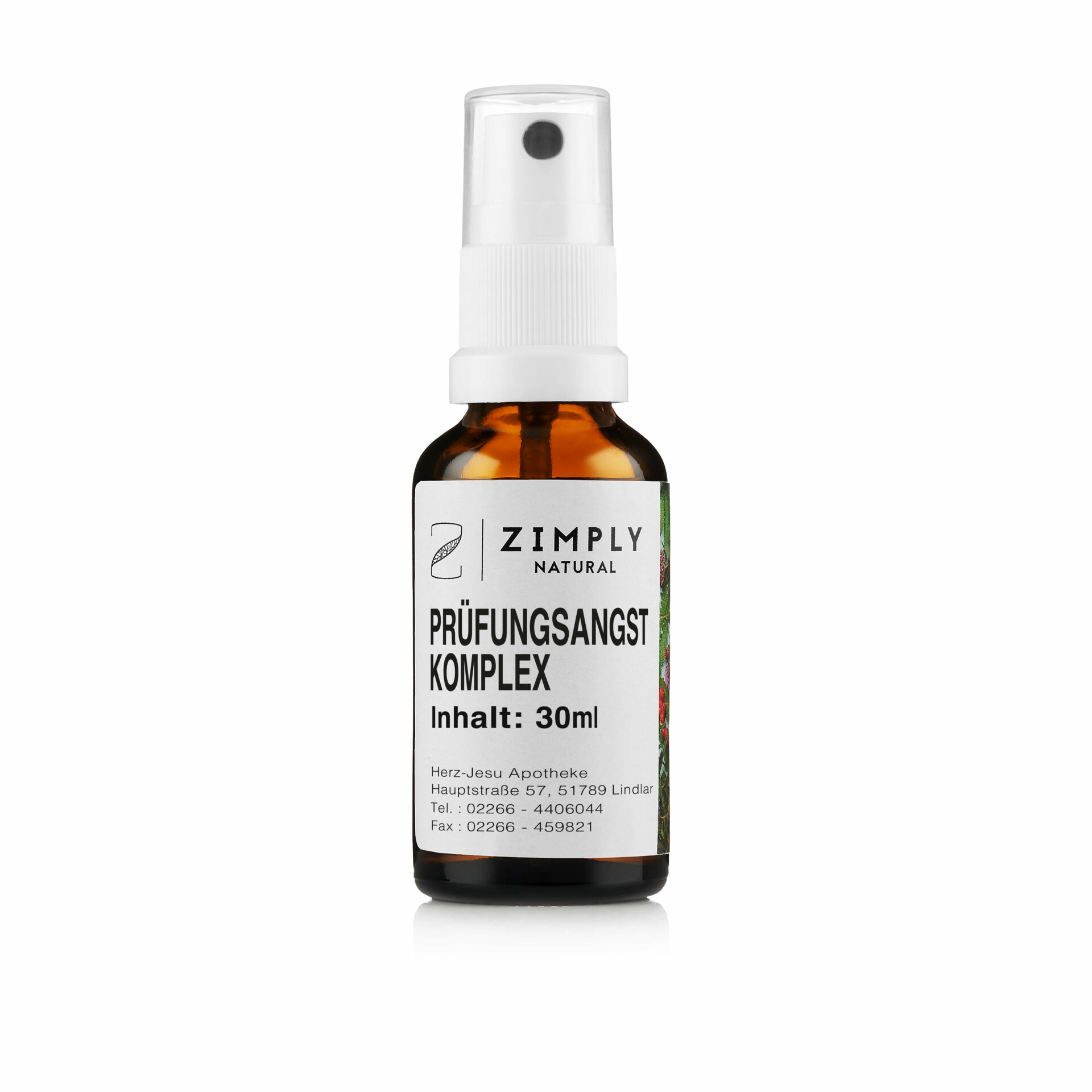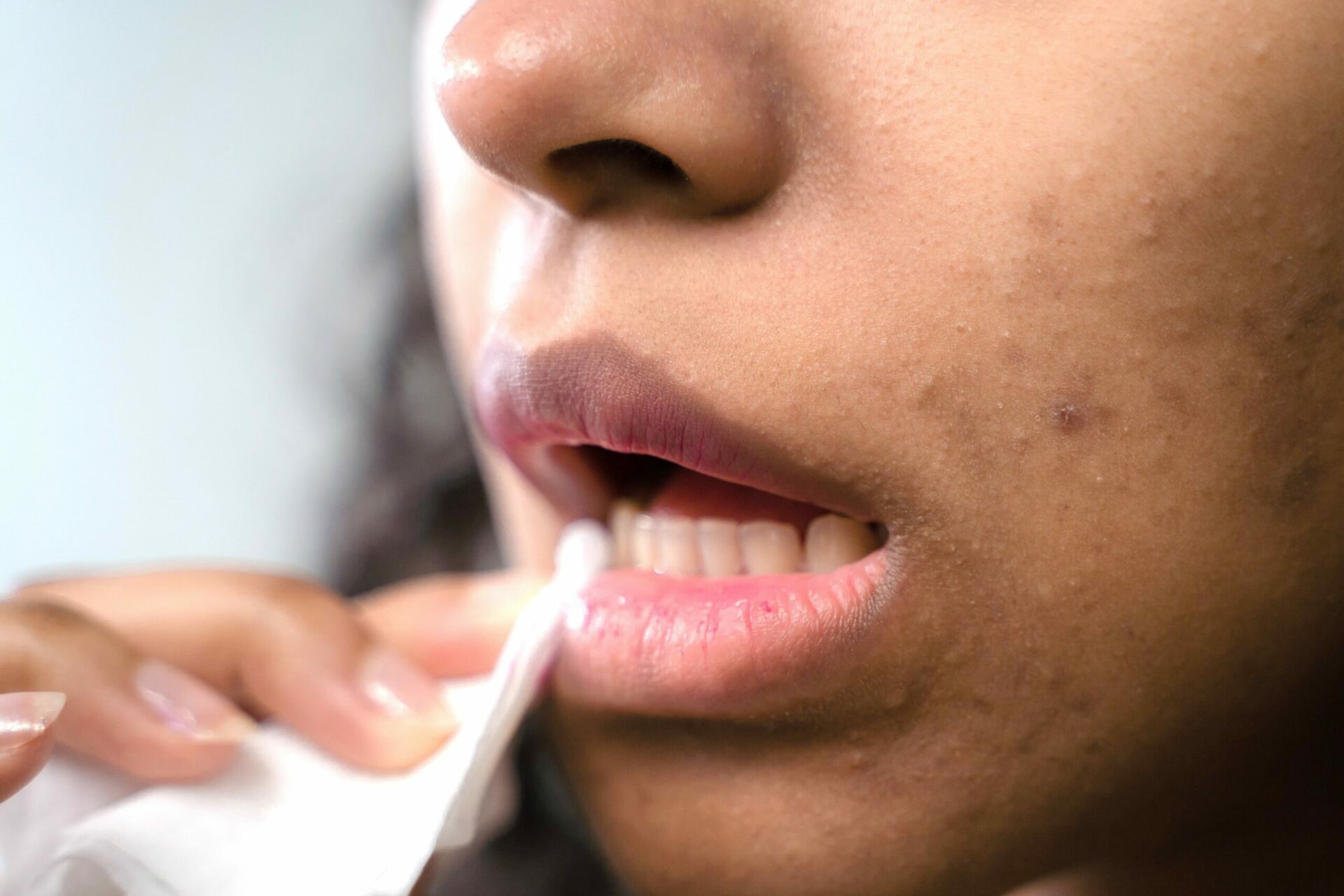Test anxiety is a common phenomenon that affects many people, regardless of age, educational background, or experience level. This anxiety often arises from the fear that our skills or knowledge may not be sufficient to successfully handle an upcoming exam or assessment situation.
With natural methods, such as Zimply Natural's individual spagyric blends, your exam anxiety can be treated and sustainably alleviated.
Test anxiety - definition, symptoms and natural remedies
Table of contents
- What is test anxiety?
- Pathogenetic model of test anxiety
- Causes - why do I suffer from test anxiety?
- What helps with test anxiety?
- My child has test anxiety - what can I do?
- Treating exam anxiety naturally - what are the options?
- Medicinal plants for exam anxiety - the concept of Zimply Natural
- How Zimply Natural can help you with exam anxiety
What is test anxiety?
Test anxiety is an emotional reaction to the thought of taking an academic exam and can manifest itself in physical, mental, and emotional responses. It can affect performance on exams and other assessments. This type of anxiety manifests itself in preoccupation with the thought of an exam, excessive worry about failing, not knowing enough about the material or feeling like you have to get every answer perfect, difficulty concentrating due to increased stress levels, and feeling overly anxious even when there is no exam coming up. Studies estimate that, on average, between eight and twenty percent of students from elementary school through college struggle with an overwhelming sense of anxiety about tests or other school assessments. Test anxiety interrupts the learning process, which translates into poorer academic performance, and interferes with memory formation, which affects recall on exams. This problem must be taken very seriously because it can seriously affect students' academic progress if left untreated.
Symptoms - How do I determine that I suffer from test anxiety?
The symptoms of test anxiety can be very different and vary from person to person. Physical signs such as rapid heartbeat, sweating, nausea or stomach discomfort often occur as a result of the stressful situation. Also Sleep disorders and loss of appetite can occur in the run-up to an exam. On an emotional level, anxiety, nervousness or even panic attacks become apparent, which can significantly impair a person's performance shortly before or during an exam. It is not uncommon for these symptoms to eventually lead to concentration problems and self-doubt, which makes learning and completing the exam much more difficult for those affected.
Can test anxiety lead to depression?
In some cases, test anxiety can be so severe that it leads to depression. This occurs when the individual overestimates their ability to cope with anxiety and/or has unrealistic expectations of their performance. This situation can lead to negative thought spirals that shatter self-perception and depressive symptoms such as listlessness, Sleep disorders, social withdrawal and concentration difficulties can cause.
Pathogenetic model of test anxiety
The pathogenetic model of test anxiety is a theory for understanding the psychology of students facing exams. It was first proposed by Sarason and Mandler in 1960 and has since served as an important reference point for analyzing the emotions triggered by exams. At its core, this model focuses on how multiple factors interact to produce high levels of general or specific test anxiety, e.g., physiological components such as arousal levels and cognitive components such as the student's internal dialogue regarding the test. By exploring the complex matrix of interactions within this model, researchers were ultimately able to better understand why certain students have more trouble with exams than others. As such, it is an invaluable tool to help educators develop initiatives that can help all children succeed.
In challenging moments, your body releases hormones like adrenaline and cortisol to help you focus on the task at hand. This gives you an extra boost so that you are full of energy even during exams!
Causes - why do I suffer from test anxiety?
Test anxiety is a widespread phenomenon from which many people suffer. The causes of this fear are complex and can be rooted in the personality of the person concerned as well as in external circumstances. One of the main causes is a lack of self-confidence in one's own ability to perform. This can be reinforced by previous bad experiences, such as poor grades or criticism from teachers and parents. Similarly, fear of the unknown, such as new questions and unexpected situations in an exam, plays a decisive role. In addition, high performance pressure and perfectionism, often caused by societal expectations, are further reasons for test anxiety. Last but not least, private problems or Anti-Stress in other areas of life contribute to people suffering from severe anxiety in exam situations. This makes it all the more important to find individual solutions that help those affected to overcome their fears and develop better strategies for dealing with exams.
Final exam anxiety
Exam anxiety is often associated with school and especially with final exams. Often, high expectations on the part of teachers, parents and the students themselves are the trigger. They put themselves under pressure to perform well because final exams are important for their future academic and professional careers. Students also often feel insecure in the exam situation because they fear they may not master the material adequately or fail in their timing. Sometimes test anxiety is also due to negative experiences, such as a poor performance in school in the past. It is important to take these fears seriously and offer students support so that they can master their exams confidently and successfully.
Driving test anxiety

Test anxiety can be a big problem for people taking their driving test because of the emotional and financial importance of passing it. It occurs when your mind is flooded with negative thoughts, such as worrying about failing or making embarrassing mistakes. Physically, people often experience an increased heart rate, cold sweats and even nausea. When taking a driver's test, the pressure can become especially high because there are many rules and regulations that must be followed in order to get a license. Knowing that any mistake will result in a failed test is another concern that drives many. People also tend to become very anxious when they are being judged by an observer who is evaluating them in a high risk environment.
The latest study from IU International University shows that nearly 9 out of 10 Germans have struggled with test anxiety, especially during their studies - over 64.7 %! It turns out that many of them also felt the same anxiety during their job search and education.
What helps with test anxiety?
There are several methods that can help with exam anxiety. One proven technique is so-called progressive muscle relaxation, in which deep relaxation is achieved through targeted tensing and relaxing of the muscles. Breathing exercises can also be useful to help Anti-Stress reduce stress and restore inner balance. Mental training or autogenic training also offer ways to achieve inner calm and composure and improve personal control over stressful situations. Identifying negative thought patterns and reformulating them into positive, confident beliefs can improve our attitude toward exams and boost self-confidence. In addition, preparing and planning for the exam, such as creating study plans and practice exercises, can also help reduce anxiety. Another effective method is developing positive thoughts and affirmations to boost confidence during the exam. Finally, sharing with other sufferers or learning time management techniques can also help control exam anxiety.
Healing stones for exam anxiety
Healing stones for exam anxiety are an interesting naturopathic remedy that can help many people better manage their anxiety and stressful situations during important exam periods. Healing stones can be an effective support during such moments of anxiety and Stresses offer. They promote relaxation, concentration and better self-confidence. By carrying these stones with you or placing them on a work surface, you can benefit from their energies and thus reduce anxiety. For example, the most well-known healing stones for exam anxiety are lapis lazuli, rose quartz and amethyst. These stones harmonize your body, mind and spirit and help you to cope with your exam with more confidence and serenity. However, it is important to note that healing stones are not miracle cures and effective preparation for the exam and proper study methodology are the keys to true success.
Tips for exam anxiety
Exam anxiety can be a real challenge, but don't worry - there are plenty of simple strategies you can use to keep your nerves in check. From getting organized and finding the right study space to setting attainable goals and taking breaks while you study, these tips will help you feel confident on exam day!

Tip 1: Preparation
With the right preparation, exams no longer have to be intimidating. If you get to grips with the subject matter properly before the exam, you can Anti-Stress Minimize and rely on you to perform at your best. Don't let poor planning ruin an otherwise open door of opportunity - start preparing today!

Tips 2: Turn off the head
Before an exam, it can be all too easy to fall into negative thoughts and self-doubt - but don't give in! Take a deep breath and remember that you are already well prepared. It is perfectly normal and expected that the examiners will see your nervousness; even if you make mistakes, there is always a chance to pass or retake the exam if things go wrong. Your mental health is more important than anything else - focus on positive affirmations so that your brain is able to perform at its best when it matters.

Tip 3: No comparisons
Do you feel overwhelmed when someone has been studying long and hard while your preparation time is just beginning? Remember that it's important to focus on yourself during exam preparation. Don't let the pressure of others distract you from your own plan - everyone needs their own path to success!

Tip 4: Breaks
Exam time can be incredibly stressful and often leads to panic and Sleep deprivation. The solution? Conscious breaks! Instead of the Anti-Stress you should switch off for a while - go out into nature or exercise; meet up with friends or family; snuggle up on the sofa, be creative and do something you enjoy. Give yourself a break from studying - it will help you focus on your studies later!

Tip 5: Don't be afraid of a blackout
Everyone has experienced the pressure of an exam, so don't worry - your examiner knows the situation just as well. If things suddenly get difficult and confusing in an oral exam, take a moment to pause and take a deep breath. It's okay to have the question repeated again or to cover another topic first if necessary. If it is a written exam, start with the tasks where you can show what you can do!
My child has test anxiety - what can I do?
Test anxiety can be a challenge for any child. However, as a parent, there are many ways to help your child overcome this fear. One way is to help your child study early and organize the material in a structured way. It's also important to set up a regular schedule to make sure your child has enough time for school and doesn't have to study at the last minute before an exam. In addition, it can be helpful to practice relaxation exercises together, such as yoga, or special breathing exercises to relieve tension. If your child still suffers from anxiety, you can work through the problem further and seek professional support, for example, at a psychological counseling center or from a doctor. Help is available to give your child the best possible chance to overcome his or her test anxiety and move confidently into the future.
Exam anxiety can be an uphill battle, but there is help besides natural remedies - especially in the form of behavioral therapy. Speak to your GP if you or your children are struggling with this problem and remedies are no longer enough!
Treating exam anxiety naturally - what are the options?

Test anxiety can occur in even the best students and affect their performance on important exams. Fortunately, there are herbal remedies that can help ease the Anti-Stress reduce and improve concentration. Such natural support are Valerian-extracts, which are available in tablets, tea or drops. They have a calming effect on the nervous system and can help you cope with your exam anxiety. In addition to valerian, there are also other herbs such as passionflower and Hops, which have similar calming effects. In addition, the intake of plant extracts such as. Ginseng improve memory and mental performance, which is especially useful during exam preparation.
Bach flowers for exam anxiety
To effectively combat this anxiety, more and more sufferers are turning to natural remedies such as. Bach Flower Therapy. Bach flowers are natural extracts of flowers, which were developed by the English doctor Edward Bach in the 1930s. They are intended to help balance negative feelings and fears and thus enable an increased sense of well-being. In the case of exam anxiety, the Bach flower essences of the plants Mimulus, Aspen and Larch have proven particularly effective. This combination can help to strengthen self-confidence, inner calm and courage and thus promote a more relaxed and optimistic attitude towards exam situations. By regularly taking these natural remedies, one can also counteract exam anxiety in a gentle and holistic way and come a big step closer to success in school, college or professional life.
Grandma's home remedies for exam anxiety
Exam anxiety is a challenge that many experience. Often, however, grandma's home remedies can come to the rescue. A cup of chamomile tea the night before the exam calms the nerves and promotes sleep. In addition, essential oils such as lavender or lemon can be used to take a relaxing bath. Chewing gum or eating chocolate can also help, as this releases the happy hormone serotonin. However, it is important that such remedies are not seen as the sole solution. Good preparation, sufficient sleep and relaxation techniques such as yoga or meditation can also help to overcome exam anxiety.
83 % of our customers recommend us!
Medicinal plants for exam anxiety - the concept of Zimply Natural
Calm your exam anxiety with our Zimply Natural blend. Take the natural way to balance body, mind and spirit - with the Spagyric!
Kava-KavaKava kava is an effective natural remedy for anxiety, thanks to its ingredients that act similarly to benzodiazepines. It helps relieve both physical and psychological symptoms of stress and anxiety, so you can experience a sense of calm in anxious moments.
Lemon balm: With its calming, nervine properties, lemon balm is a natural stress reliever. This gentle herb is used to regenerate and strengthen exhausted nerves and can help recover quickly and effectively from nervous tension.
Wild jasmine: Wild Jasmine is known for its calming properties and helps with anxious feelings. When you are very tense, Gelsemium provides much needed relaxation - it loosens tense muscles throughout the body and relieves stress-related physical symptoms such as headaches, digestive problems or constipation. In this way, it helps to release pent-up anxiety so that you can feel truly relaxed again.
St. John's wort: St. John's wort can brighten even the gloomiest mood a little! Hypericum - or "mood booster" - blocks certain enzymes in the brain that affect how we feel and think, making you feel better in an instant.
Angelica: Angelica is known for its powerful calming effect on the body, helping to reduce stress and relieve nervousness. What you may not know is that it also helps protect the liver by breaking down hormones like cortisol and adrenaline that can accumulate during times of high stress - helping us to better manage our emotions while maintaining a healthy metabolism.
Here is an overview of possible symptoms or sequelae of test anxiety:
- Palpitations/heart palpitations
- Circulatory problems
- Concentration disorders
- Constant circling of thoughts
- Inner tension
- Digestive problems
- Memory disorders up to blackout
How Zimply Natural can help you with exam anxiety
At Zimply Natural, we believe that nature has the power to improve health and well-being. That's why our spray against exam anxiety contains a blend of natural Plants and herbs that we have carefully selected from over 75,000 available recipes! Our formula is made with pharmaceutical quality control and then delivered directly to your door, free of charge, for fast relief when it matters most: during exams. Try this unique approach today to fight your anxiety for good!

So that you can Test anxiety with ease, our spray is very easy to use. A few sprays taken regularly over a period of six to eight weeks will ensure that your worries don't stand in the way of your success - simply follow the dosage instructions and enjoy going into your exams feeling relaxed.
Use nature not only for exam anxiety!
In addition to best-selling blends, Zimpy Natural also offers custom formulations. Our Configurator helps you to accurately assess your individual situation. At Zimply Natural, we know that everyone's health needs are unique. That's why our configurator takes into account individual symptoms and conditions to find the perfect blend of natural ingredients for you! With more than 100 available Healingplants in combination with your answers to Menopause, Anti-Stress or Herpes - to name a few - we create an optimal blend specifically tailored for each person who uses it. Discover today how easy it can be to achieve better health with Zimply Natural!







